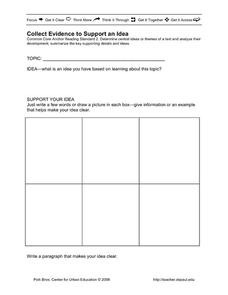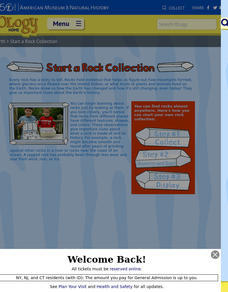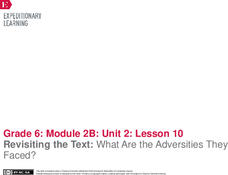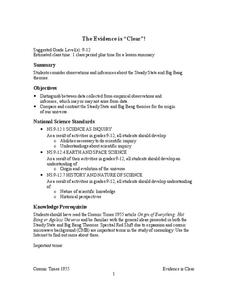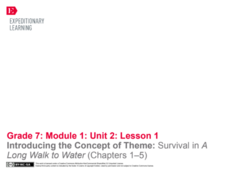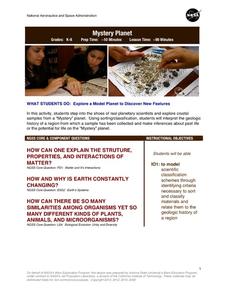Polk Bros Foundation
Collect Evidence to Support an Idea
In order to support an idea, writers must use evidence. Your class members can prepare their evidence with this basic worksheet. Writers note down the topic they are learning about and their own idea. Next, they come up with information...
Scholastic
Study Jams! Scientific Theory & Evidence
Introduce someday scientists to ideas and explanations about how the world around us works by showing this cute cartoon. In it, Mia and Sam discuss what scientific theory is, and how it is important in discovering scientific laws making...
Scholastic
Citing Text Evidence
Could you go without your cell phone for 48 hours? Pose this question to your class and then read the article provided here. Pupils mark the text and and complete a graphic organizer that requires the use of textual evidence.
Cornell Lab of Ornithology
Investigating Evidence
Explore the scientific process through nature. Scholars become scientists as they develop a question, design an experiment, collect data, and analyze their results. A two-week lesson guides your classes through the process and provides...
American Museum of Natural History
Start a Rock Collection
Rocks hold evidence of Earth's past. A three-step guide describes the process of creating a rock collection. It provides a data collection sheet to make notes about each sample.
Simon & Schuster
Classroom Activities for Ethan Frome by Edith Wharton
Edith Wharton's Ethan Frome is the focus of an 11-page packet that includes three lesson plans, three worksheets, and a homework assignment. The first lesson introduces readers to the historical context of the novel. At the same time,...
EngageNY
Grade 9 ELA Module 2, Unit 2, Lesson 15
The terrible truth begins in a lesson plan that focuses on the final act of Sophocles' Oedipus the King. As ninth graders collect evidence that details the origin of Oedipus and how his birth relates to the prophecy everyone tried to...
EngageNY
Revisiting the Text: What Are the Adversities They Faced?
Where's the evidence? Scholars take a look at the evidence section of a Literary Argument Essay Rubric. They discuss terms used in the rubric and then begin thinking about collecting evidence for their own essays. They also revisit their...
National Endowment for the Humanities
Characterization in Lord of the Flies
Readers of Lord of the Flies hunt down direct and indirect examples of how William Golding brings his characters to life. After instructors guide learners through the process of collecting evidence of these two types of characterization...
NASA
The Evidence is “Clear”!
Do you think you know better? Become a scientist and prove it. Scholars review the evidence for two different theories of the origins of the universe. They notice the empirical observations as well as the inferences to determine which is...
Curated OER
Independent Plant Growth Experiment
This is an awesome lesson filled with tons of engaging learning activities. Over a period of weeks learners will make observations, collect plant and analyze plant data, read and review agricultural articles, design and conduct an...
EngageNY
Science Talk: How do Bullfrogs Survive
Following the reading of the book Bullfrog at Magnolia Circle, the ninth instructional activity in this unit involves emerging experts in a science talk about how bullfrogs survive. Looking back through the text, young scholars prepare...
Curated OER
"The Story of an Hour" Lesson 5: Teacher's Guide and Notes
Learning how to craft a compelling argument supported by evidence and logical reasoning is an essential skill. The fifth lesson in "The Story of An Hour" unit asks young scholars to formulate an argument in response to the question, 'Is...
EngageNY
Grade 9 ELA Module 2, Unit 2, Lesson 19
Now that readers can see the full scope of Sophocles' Oedipus the King, they can draw connections between the dramatic ending and the textual evidence throughout the Greek tragedy. As they prepare for the unit assessment writing prompt,...
EngageNY
Grade 9 ELA Module 2, Unit 2, Lesson 12
Ninth graders demonstrate their understanding of a central idea in Oedipus the King with a mid-unit writing assessment. Writers formulate a claim about the connection between prophecy and Oedipus's actions and craft an in-class essay...
K12 Reader
"How Do I Love Thee?" Supporting Ideas
Show your class what poem the famous line "How do I love thee? Let me count the ways" comes from. Class members read Elizabeth Barrett Browning's poem and respond to one question with a short paragraph. The question asks learners to use...
Google
Beginner 4: Searching for Evidence for Research Tasks
Having a strong searching skill set can make a research project much easier and much for successful for pupils. Tackle finding evidence with the ideas included here. The ultimate goal is for class members to learn the stepping stones...
EngageNY
End of Unit Assessment Parts 1 and 2: Evaluating Arguments and Claims
Which came first: the chicken or the egg? As part of the end-of-unit assessment for The Omnivore’s Dilemma, scholars watch a video about organic eggs versus conventional farm eggs. They use graphic organizers to collect evidence as they...
EngageNY
Launching the Performance Task: Planning the Two-Voice Poem
Two voices, one poem. Scholars learn about and write a two-voice poem using graphic organizers, model poems, and guides. They practice reading poems with a partner and discuss how a poem of this type could help compare Salva and Nya in A...
Discovery Education
Fuss About Dust
Dust is everywhere around us; it's unavoidable. But what exactly is dust and are certain locations dustier than others? These are the questions learners try to answer in an interesting scientific investigation. Working independently or...
Alabama Learning Exchange
Wheels All Around
Budding mathematicians explore the concept of skip counting. They practice skip counting as they use it to determine the number of wheels that come to school at 3 different times throughout the day. They also create a data graph to show...
NASA
Mystery Planet
What can one learn about a planet based on a small surface sample? Learners will explore artifacts from a mystery planet and see what they can determine about the planet based on the evidence in front of them.
EngageNY
Analyzing Character: Understanding Atticus (Chapter 1, cont.)
Scholars use a Note-catcher to gather text evidence to reveal the character of Atticus Finch in To Kill a Mockingbird. After collecting evidence, they work with a partner to make an inference about the character and then share their...
Curated OER
Character Analysis and The Crucible
Readers of The Crucible use a SATDO chart to collect evidence they will use to craft interpretive statements and an analysis of one of Miller’s characters. Background information on the play and about Miller, links to handouts,...


